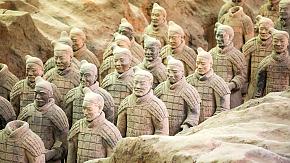Language Tips for Travelling to a China
While travelling to a new, far-off destination is always exciting, it can also be a little worrying and stressful. Here I will try to relieve you of one of the unnecessary worries of travelling. Many people, I find, worry about language. When I invited one of my family, an outgoing, confident, teenage girl to visit me in China, her first reaction was "No one will understand me; I won't understand anyone!" That's kind of understandable concern, but quite untrue. My son spent three days in Beijing, then travelled all the way to the south of China to visit me with no problems, despite not knowing one word of Chinese.
Around the world, more people can speak English than can be said for any other language, so many people in the popular destinations will have at least some English. Buy a phrase book, learn a few niceties such as 'hello', 'goodbye', 'thank you' etc and you will delight the people you meet. We all like when people make even the smallest effort to reach out.
 My well-thumbed Chinese phrase book
My well-thumbed Chinese phrase book
I remember one day while visiting Japan, I met this old woman in the countryside who looked at me most suspiciously until I said to her the only word I knew in Japanese, "Kon'nichiwa" meaning "Hello". Her ancient, frowning face cracked into a beautiful smile which totally made my day! Or maybe made the trip!
Remember, just a few words or phrases can make all the difference. No one is expecting you to have a detailed discussion about nuclear fission or fusion, whatever they are.
READING SIGNS etc.
For me, the worst aspect of language is when I arrive in a country which does not use the same writing system as we do, the Roman alphabet. In Europe and the Americas and even places such as Vietnam, even though I may not know their languages, some words are easily recognisable. If I need to find a bank in France I will look for the la banque; in Spain, el banco etc. Often words in different European languages are similar, but not always and some words which look similar may be very different – in French travail does not mean travel, for example. It means work.
I remember visiting Moscow and, as it was then known, Leningrad, now St. Petersburg, and being totally confused. This was in the dying days of the Soviet Union and back then shops etc. didn't really have names or even window displays. They merely had a name describing what they sold. "Women's Clothing", "Shoes", "Supermarket", but in the Cyrillic script that Russian and related languages use.
I was baffled. But I knew what to do. The alphabet is vaguely similar to ours, unlike say, Korean. I decided to learn it. It took one afternoon in the hotel. Next day, I wandered out and suddenly the building opposite called PECTOPAH was a restaurant. P is R, C is S, H is N, so RESTORAN. Near enough! The БАР was a bar, the СУПЕРМАРКЕТ was the supermarket and sure enough I found the bank – БАНКА. I never found out what the shoe shop was, but luckily I didn't need shoes!
Of course, this only works if the language concerned uses an alphabet at all, never mind one close to the English one. And it doesn't help with spoken language. If you have ever studied French, you will know that pronouncing French as if it is English will leave the average French person wondering which language you are speaking. And it is the same with many languages. Although Vietnamese uses a customised version of the Roman alphabet, the pronunciation is unpredictable. This leads to most people mispronouncing the name of the famous Vietnamese noodle dish Pho? as 'foe' instead of 'fuh', as the locals do.
Then imagine the complexity of languages such as Chinese which don't even have an alphabet. In Chinese, each syllable is one character. This is something like every word being like "OK" but way more complicated. English has 26 letters; Russian has 33. No one really knows how many characters Chinese has but certainly in the high tens of thousands. It is said that, just to read a basic newspaper, you need to know around 3,000 characters; educated people know around 8,000. I learned the Russian alphabet in around four hours; learning 8,000 Chinese characters would take me four lifetimes! Then I'd have to start on the grammar!
So, when I arrived in China the first time, I instantly became totally illiterate. Nothing made any kind of sense. That was twenty years ago and back then, even in the large cities, nothing was signed in English. Even public conveniences didn't tell which one was for me and which for my lady companion. No English and not even the internationally recognised symbols depicting gender. All they had was 男 and 女, which I now know mean 'man' and 'woman', respectively. This I needed to work out quickly!
Of course, things have changed as China has become more open and more visitors arrive. Today, English is common in all the main visitor destinations and many of the minor ones. Banks all have English signs, even if no one in that particular branch knows English and most ATMs have an English option in larger cities. English is a compulsory subject not only in China but also in many schools across Asia, so most of the younger generations speak some English; many speak excellent English. I have one friend in Vietnam who speaks fluent Chinese, English and French alongside her own language. This is more common than people realize.
Also most countries have adopted the international pictographic signs. It always amuses me when travelling on the expressway in China to see a sign with the fork and knife logo informing me there is a restaurant coming up. The chances of the restaurant actually having a fork and knife are negligible, but it is still understood by everyone to be a place to eat. Chopsticks wouldn't really make a good sign.
PINYIN
Also, in the 1950s, China developed a transliteration system to write Chinese using a modified version of the Roman alphabet. This is known as Pinyin and is often used on street signs, shops etc. Again, you would have to spend a short time learning Pinyin as the letters do not always have the same pronunciation as in English. Like not pronouncing French as English, Pinyin isn't English, either. For example, 'c' is pronounced like 'ts' at the end of 'cats'.
One day during a visit back to London a friend said to me, "Hey, you've lived in China a long time. What do you think of "feng shoo-ey?" pronouncing the 'e' in 'feng' as she would in 'egg'. I had no idea what she was talking about. A few days later, we were in a bookshop and she said "Look, Feng Shoo-ey!", pointing at a book called "Feng Shui", which in Chinese is pronounced like "fung shway". In Chinese and Pinyin, 风水 fēng shuǐ.
But Pinyin only tells you the Chinese pronunciation and not the meaning. "Bank" for example is 银行, in Pinyin 'yín hang'. Note those little marks above some vowels in the Pinyin (and in Vietnamese)? They are the tone markers. Mandarin has four marked tones, plus a neutral tone, making the language very difficult for people whose native language doesn't use tones in the same way – i.e. all European languages. Note that the tone markers rarely appear on signs.
I can hear you screaming! "Stop! Too complicated!" Worry not! You don't need to know any Chinese to thoroughly enjoy a visit to the magical country that is China, although as I said, knowing a little can enhance the experience. Your hotel will have English speakers; your guides will speak English. And when it all gets too confusing, someone unexpected will pop up and surprise you with excellent English!
I remember being in Yunnan province, near the China-Myanmar border, deep in the countryside and far from any tourist facilities or guides. I was searching for a Buddhist temple that I had read about. After a long, exhausting walk in the blazing heat, just as I thought I must be near, I came across a sign in three languages. Chinese, Burmese and Bai, the language of one of China's ethnic minorities, who mainly live in that area. I couldn't read anything. As I stood there perplexed, a young Chinese man walked up to me and asked "Can I help you?" in pure London-accented English. I almost wept with gratitude! Amazingly, he was a monk from the very place I was looking for and had studied in London. Similar things have happened to me in Vietnam, Thailand, and India etc.
Of course, I'm only using China and Chinese as an example. The same as above or similar can be said for many other languages such as Arabic, Thai, Korean etc. which use very different scripts and in the case of Arabic is even written in a different direction. (Side note: several people have asked me about which direction Chinese is written in – left to right, right to left or top to bottom? Today, Chinese is usually written left to right, the same as English. However classical Chinese was right to left and occasionally is still used on historical monuments etc. It is also sometimes still written top to bottom, for artistic purposes.)
 The old East Gate to my city. The name is in traditional Chinese characters and reads right-to left. Today it is 东门.
The old East Gate to my city. The name is in traditional Chinese characters and reads right-to left. Today it is 东门.
READING MENUS
The language issue people worry about most is menus. Facing a menu entirely in an unknown script is daunting and frustrating, especially when you are hungry, but again, in many restaurants, there are both picture menus and English translations. Picture menus may seem down market in some western countries, but not so in Asia. Even top-class restaurants and hotels will have picture menus and most probably, English translations. I recently visited Vietnam on my own and ate like a king, despite not knowing a word of Vietnamese.
 Chinese only menu from Xi'an
Chinese only menu from Xi'an
 Vietnamese picture menu page
Vietnamese picture menu page
 Translated menu from Guangxi, China
Translated menu from Guangxi, China
Also, in most places it is acceptable to subtly point to other diners' plates if their meal takes your fancy. I have occasionally received unexpected surprises, but nothing nasty and it just added to the fun!
If you really need help, look for college aged people. Even if they don't know English well or at all, they will probably know someone who does Almost every university in the world has an English department and, in my experience, language students are eager to practice their spoken language and generally happy to help.
Beware however of over-friendly English speaking "students", usually young women, who suggest going to a bar, teahouse or jewelry store. This is a common scam in tourist areas in many parts of Asia. You will be hit with an astronomic bill for cheap beer, bad tea or worthless, fake gems. These people tend to mainly target single men, but not always.
Always remember, in any given situation, there are only a few things that a person is likely to be trying to tell you and it is often easy to guess. We do that all the time in our own language. We never hear everything someone says; our mind drifts off, yet somehow we come back knowing what has been said. You can do the same in a language you don't know or know only a little. Also, gestures are very useful. However, be careful. Some gestures we use innocently in western countries can be highly offensive in others. Again, a little research before you travel will help avoid embarrassing or even threatening situations. There are many examples of "What not to do in ______" type internet pages and videos.
I also recommend downloading a reasonable bilingual dictionary to your digital device of choice, but make sure it works in your intended destination. Some apps and websites are blocked in certain countries. Again an internet search should help you know what works and what doesn't.
 An app for learning Chinese
An app for learning Chinese
But most of all I recommend just not worrying and accepting any confusion as just part of the adventure.
Remember Odynovo Tours is dedicated to helping you to not only enjoy your travel and offer travel advice but can also customise your experience to match your individual needs.
Quick Question
What Our Clients Say
Explore the latest verified reviews of Odynovo's travel services on Tripadvisor, Google, Trustpilot, Product Review and more trusted platforms.





